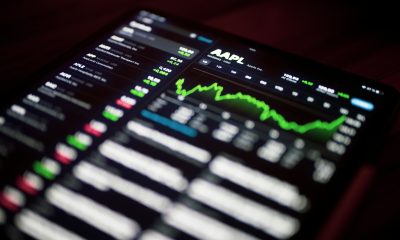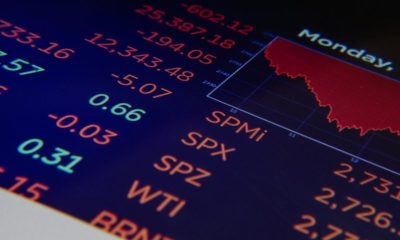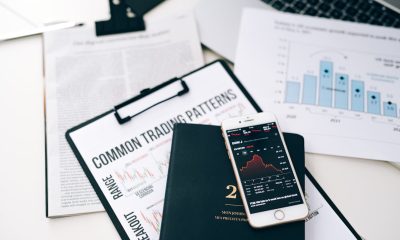Markets
Should the stock market fear the change in global central banks?
Americans are now in more debt than they were at the height of the credit bubble in 2008.

Trump’s economic agenda has become further delayed by what seems like daily leaks from the White House. This may finally bring about the long-awaited equity market pullback of at least 5 percent. However, what will prove to be far more troubling than Trump’s ongoing feuds with the DOJ and the press, is the upcoming market collapse due to the removal of the bids from global central banks.
The markets have been feeding off artificial interest rates from our Federal Reserve and that of the European Central Bank and the Bank of Japan for years. In addition, the global economy has been stimulated further by a tremendous amount of new debt generated from China that was underwritten by the PBOC. After it reached the saturation point of empty cities, China is now building out its “Belt and Road Initiative” that could add trillions of dollars to the debt-fueled stimulus scheme that has been spewed out over the worldwide economy.
Adding to this, the NY Fed just informed us that households are spending like its 2008. In fact, Americans are now in more debt than they were at the height of the 2008 credit bubble – a new high of $12.7 trillion – exceeding debt loads right before the entire financial system fell apart. In fact, Total U.S. debt has now reached 350% of GDP.
The perma-bulls on Wall Street argue this willingness to take on debt demonstrates optimism among banks and consumers about economic growth. But the truth is the bull market in equities has been fueled by a record-breaking pace of Central Bank money printing and an unsustainable accumulation of global debt that has reached $230 trillion, or 300% of GDP.
Right now, the daily leaks out of the White House are sucking all the oxygen out of the room. But worse, they are delaying what Wall Street really needs to sustain the illusion of economic viability – a massive corporate tax cut that is not offset by eliminating deductions or reduced spending. After all, the market is in a desperate need of a reason to justify these valuations now that the Fed has abandoned Wall Street – at least for the time being.
But the truth is this extremely complacent and overvalued market has been susceptible to a correction for a very long time. But just like Trump, it has so far behaved like it is coated in Teflon. North Korean Atomic bomb tests, Russia election interference, Trump’s alleged obstruction of justice, an earnings recession, GDP with a zero handle; who cares? As long as a tax cut could be on the way and global central banks keep printing money at a record pace, what could go wrong?
It is still unclear if the latest Trump scandal provides an opportunity to yet again overlook these salient facts and simply view this sell-off as just another buying opportunity. However, in the longer term, we believe that the inevitable exodus of Central Bank manipulation of interest rates is going to bring chaos to the major averages, as it blows up the asset bubbles that have been underwritten by the mountain of new debt purchased by these same banks.
The Fed has ended its QE programs, for now, and is marching down the dangerous path of interest rate normalization. And the ECB will be forced to follow shortly. It is then that these bankers will realize that the record amount of debt they sponsored requires a record low level of debt service payments to keep the solvency illusion afloat. Once this bond bubble pops it will prove devastating for those investors that have been inculcated by central banks for decades that every single downtick in stocks is a buying opportunity, along with the mistaken and dangerous belief that active investing should have gone extinct long ago.
—
DISCLAIMER: This article expresses my own ideas and opinions. Any information I have shared are from sources that I believe to be reliable and accurate. I did not receive any financial compensation in writing this post, nor do I own any shares in any company I’ve mentioned. I encourage any reader to do their own diligent research first before making any investment decisions.

-

 Impact Investing2 weeks ago
Impact Investing2 weeks agoEU Backs 90% Emissions Cut by 2040 and Delays ETS2 Rollout
-

 Markets7 days ago
Markets7 days agoMarkets, Jobs, and Precious Metals Show Volatility Amid Uncertainty
-

 Biotech2 weeks ago
Biotech2 weeks agoDNA Origami Breakthrough in HIV Vaccine Research
-

 Cannabis4 days ago
Cannabis4 days agoAI Can Mimic Psychedelic Experiences but Cannot Truly Feel Them, Study Warns


























You must be logged in to post a comment Login